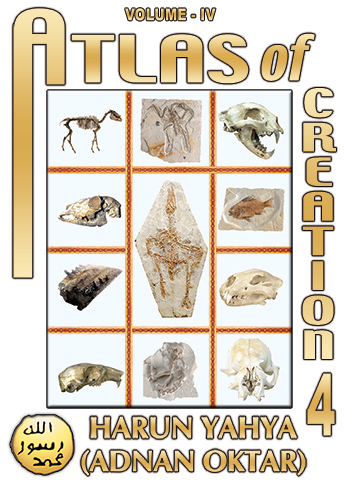Bigotry: The Dark Danger
Atlas of Creation-Vol.4

DOWNLOAD THE BOOK
CHAPTERS OF THE BOOK
- Introduction
- Stromatolites: 3.9-million-year-old living marvels that refute the theory of evolution
- Trilobites: marvelous life forms that lived 530 million years ago refute evolution
- Luminous life forms: marvelous life forms that have been manufacturing light for millions of years refute evolution
- Flying insects: marvelous life forms with perfect wings that lived millions of years ago refute evolution
- Specimens of terrestrial animal and bird fossils -1
- Specimens of terrestrial animal and bird fossils -2
- Marine Fossil Specimens -1
- Marine Fossil Specimens -2
- Marine Fossil Specimens -3
- Insect fossil specimens -1
- Insect fossil specimens -2
- Insect fossil specimens -3
- Insect fossil specimens -4
- Plant fossil specimens -1
- Plant fossil specimens -2
- Plant fossil specimens -3
- Darwin's Dilemma: The Soul / Introduction
- Materialism has collapsed and disappeared
- The external world behind Quantum physics
- The brain is not the source of personal identity
- Darwin's dilemma: The soul
- The perception of time and the fact of destiny
- Conclusion
- How did the Dajjal Die? / Introduction
- Part 1 - Dajjal: The Greatest Trial of the End Times
- Part 2 - The System of the Dajjal is Managed by Atheist Freemasonry
- Part 3 - Darwinists have Deceived the Whole World with Frauds - 1
- Part 3 - Darwinists have Deceived the Whole World with Frauds - 2
- Part 3 - Darwinists have Deceived the Whole World with Frauds - 3
- Part 3 - Darwinists have Deceived the Whole World with Frauds - 4
- Part 3 - Darwinists have Deceived the Whole World with Frauds - 5
- Part 4 - Darwinists' Methods of Deception of the World - 1
- Part 4 - Darwinists' Methods of Deception of the World - 2
- Part 4 - Darwinists' Methods of Deception of the World - 3
- Part 4 - Darwinists' Methods of Deception of the World - 4
- Part 4 - Darwinists' Methods of Deception of the World - 5
- Part 5 - The Darwinist Deception has Finally Come to an End
- Conclusion - Almighty Allah is the Creator of Life
< <
21 / total: 39
The Brain Is Not the Source of Personal IdentityThe Flawlessly Equipped Human BrainThe perceptual world whose details we have been examining is an artificial one, formed by way of electrical signals. But do our brains interpret these signals and convert them into a friend we recognize, a beautiful flower, a boundless landscape, children playing in the street or a loveable kitten?  Each neuron in the brain makes up to 10,000 contacts with other neurons. The places where they contact are known as synapses, which are the places where information is exchanged. The number of the possible permutations and combinations of this cerebral exchange exceeds that of all the elementary particles in the known universe. Technically, it’s true that the signals are analyzed in the brain. Materialists go on to claim that we consist simply of our brains’ neurons and that the world we inhabit is the result of intercommunication between those nerve cells. They maintain that an entity who thinks, laughs, rejoices, recognizes other people and can analyze is, in the words of the evolutionist physicist and discoverer of DNA Francis Crick, “a pack of neurons.” 83 For a materialist, it is unimportant how human beings think and how they draw significance from their perceptions. It is unimportant because materialists have no explanation for these things. In their view, everything must be investigated in a material sense. The fact is, however, that this is a great falsehood uttered in order to turn people away from faith in Allah. To clarify this in more detail, it will help to familiarize ourselves with the general outlines of the human brain, one of the most complex structures in the world.
A nerve cell in the brain possesses all the structures necessary to maintain for the cell’s metabolism, for it to digest proteins and perform all the needed functions. Another extension departing from the neuron is called the axon, whose job is to carry information to other neurons. This information assumes the form of an electrical current. The brain contains depots for the storage of neurochemicals, vesicles that release these chemicals to carry messages to the next cell in the circuit. Neurons thus carry information along to the next neuron by way of axons. To put it another way, dendrites take the information forwarded from another neuron, and axons forward it on to another neuron. Axons may extend for as long as a meter, or else be just few tenths of a millimeter. How many different types of neurons are there in the brain? That question has not yet been fully answered, though there are estimated to be around fifty. 85 Despite the differences in their shapes, sizes, types of connection and neurochemical contents, all neurons carry information in almost the same manner. They communicate with one another in an electrochemical “language.” Information emerges from one neuron and is received by another in the form of electrical signals produced by charged atoms or ions, particularly positively charged sodium and potassium ions or negatively charged chloride ions.86Each of the 100 billion neurons establishes connections with between a few thousand and one hundred thousand other neurons. In general terms, an adult brain establishes 100 trillion synapses, or connection points. 87 Crag Hamilton describes:
Between the space where the axon that transmits the information in a neuron contacts another neuron’s dendrite is a gap around one millionth of a centimeter wide.89Therefore, axons and dendrites do not touch one another directly. Connections take place in less than one thousandth of a second. Some neurons sprout as just a few dendrites; others have a very large number. Were we to try to count the number of connections arising inside the brain, at a rate of one every second, it would take 3 million years, or 42,000 human generations.90In her book An Alchemy of Mind, The New Yorker magazine writer Diane Ackerman, of Cornell University, provides numerical details about this complex system:  Computers are merely an imitation of the brain’s perfect system. One byte of information in the brain can be instantaneously disseminated to 100,000 neurons. Therefore, the brain is hundreds of thousands of times faster than the fastest computer. It is impossible to compare the brain with modern-day technology.
One of the most astonishing facts is that any given human brain, with these extraordinary statistics, is never identical to any other brain. Brains are not the same even in identical twins. This amazingly complex system has been arranged separately and assumes a different form, by the will of Allah, in every human being. Yet it still maintains the same complexity.93 Computers are designed by imitating the perfect system in the brain. Kerry Bernstein, an experienced technology expert with IBM, one of the largest firms in the computer field, says that although computers have copied the brain in many respects, the design in the brain is too perfect to be replicated using any existing technology. Bernstein makes the following comment: There is an extraordinary parallel circuit in the brain. A single data byte can reach 100,000 neurons at the same time. This makes the brain hundreds of thousands of times quicker than the fastest known computer. It is impossible for us to carry this out electronically.94 Therefore, comparing the brain to a computer is too facile, and does not do full justice to the brain’s superior capacity. Gerald M. Edelman offers this statement:
 Within the brain, where do the external world and the features that make human beings human reside? Can neurons consisting of accumulations of blind, unconscious atoms be the source of such a sublime consciousness? Of course not! Its origin lies solely in the human soul. The system in the brain is literally perfect; what we are referring to here is the interactions of neurons, with axons and dendrites receiving and transmitting data within a complex system. But what is the source of the “outside world” in the brain and the features that make human beings human? Could neurons and the brain they comprise—the products of the combining of blind and unconscious atoms, be the source of such advanced consciousness? Professor Vilayanur Ramachandran has this to say:
This is a baffling state of affairs for materialists, who look somewhere in the brain for all those elements that make human beings human—joys, doubts, beliefs and personal identity. They maintain that emotions such as the happiness when we greet a friend, the excitement when we see a puppy, belief, feeling, deciding, sentimentality, rejoicing and sorrow—all stem from neurons. However, scientists and neurologists who investigate the brain have failed to find the source of any of these. For that reason, they have come up with a new definition, saying that the source of what makes human beings human is “consciousness.” But what is consciousness? And how can materialists account for it? The Concept of “Consciousness” That Materialists Cannot Explain
Fred Alan Wolf provides this answer:
Scientists now realize that the brain is not the source of perceptions, and that it merely serves as a vehicle. Furthermore, scientists have entirely abandoned the idea that prevailed centuries ago of the “little man inside the brain.” Scientists have clearly seen that the entity they refer to as the “observer” is entirely independent of the brain. They now know that the source of perceptions is human consciousness. In his book Closer to Truth: Challenging Current Belief, Robert Lawrence Kuhn offers this description:
A person’s life, perception, love, joy, sorrow, thoughts—in short, all that makes human beings human—is very definitely not the product of the behavior of atoms. What endows human beings with humanity, makes them capable of perceiving the external world, is something independent of the human brain. We need an explanation beyond any material concept to account for someone being able to be aware of something, to analyze it, think and choose, and for all other human characteristics. These words by Thomas Huxley are significant evidence that even a committed materialist can see the true facts, despite his being an evolutionist and even known as “Darwin’s bulldog” : 99
It is impossible for a structure consisting of fat, water and protein to give rise to human identity that can perceive, think, and rejoice, an entity capable of feeling pride and excitement. Materialists’ claims have completely collapsed in the face of the fact that perceptions are independent of the brain. Sir Rudolf Peierls, one of the 20th century’s leading physicists, has said this:
Peter Russell says that the material world belonging to us is something solely produced by consciousness:
What we attempt to describe as reality is actually based on consciousness. Color, sound, smell, taste, time, matter—in short, everything that we perceive in the world is a form and feature within consciousness. Thanks to our consciousness, we are able to conceive all things in the universe. But we cannot observe consciousness in the external world. Peter Russell sets out the reason why:
As Russell states, the consciousness that perceives the outside world is not inside the external world we observe. Therefore, it is impossible for us to see and analyze it. Russell likens consciousness to light reflected onto a cinema screen. In the story portrayed in the film, there is no evidence that only light rays are being projected onto the screen. Human beings have direct experience with only the image on the screen. The light itself, without which there can be no image at all, goes unnoticed. In the same way, consciousness possesses no tangible, visible existence since it is not in the material world we observe. Diane Ackerman has described consciousness in these terms:
It is He Who first produced you from a single self, then from a resting-place and a repository. We have made the Signs clear for people who understand. (Surat al-An‘am, 98)  The Source of Consciousness: The Human SoulSo far, we have proved that the external world we perceive consists of a shadow world that arises within consciousness, and that we can never directly experience material existence. In the light of these conclusions, the concept of “absolute matter” envisaged by materialist philosophy loses all validity. Yet we still face an important difficulty that needs to be explained. Peter Russell summarizes the question:
He Who has created all things in the best possible way. He commenced the creation of man from clay; then produced his seed from an extract of base fluid; then formed him and breathed His Spirit into him and gave you hearing, sight and hearts. What little thanks you show! (Surat as-Sajda, 7-9)  This really important question should be clarified. What is consciousness made up of? What gives rise to this whole vivid world inside consciousness? This is a question that 21st-century scientists are still seeking to answer, about which they write books and hold conferences and seek to resolve—but which, for some reason, they are reluctant to settle. Hundreds of books and articles and analyses by countless scientists have failed to provide the expected answer to what the source of consciousness is. The subject of consciousness is regarded as one of the greatest mysteries of the 21st century. Almost all researchers, writers and professors concerned with the topic have begun by stating that the subject is as yet unexplained, and end by again emphasizing that inexplicability. One such example is these words by Jeffrey M. Schwartz:
 Contrary to the idea that materialist scientists seek to impose on us, the subject of consciousness is not inexplicable. The soul bestowed on human beings by Allah is a conscious entity aware of its own existence. No matter how much materialists may wish to deny it, any conscious human beings will indisputably be aware of the souls they bear. But is this subject really impossible to explain? Or does it suggest a fact that scientists are unwilling to see? Are scientists who defend quantum physics under the influence of the materialism they have for so long regarded as the truth? Or is something else preventing them from seeing the truth? Consciousness is very definitely not incapable of explanation. The entity that says “I see” the image in the brain, that says “I hear” the sounds in the brain, the entity that is aware of its own existence, is the soul bestowed on mankind by Allah. Materialist minds are unwilling for this to be known. They refrain from this truth being noticed. That is the basic reason why materialist scientists claim that the issue of consciousness “has still not been resolved.” The absolute existence of the soul, and the fact that it is Allah Who bestows the soul on human beings, utterly overturn all their materialist beliefs and claims. No matter how much they attempt to brand the subject as “inexplicable,” it is the soul that is the source of consciousness and that says “I am me.” In the Qur’an Allah has revealed that He first created the human body and then breathed His spirit into it: When your Lord said to the angels, “I am creating a human being out of dried clay formed from fetid black mud. When I have formed him and breathed My Spirit into him, fall down in prostration in front of him!” (Surat al-Hijr, 28-29) This is the most essential fact that scientists investigating the subject need to accept and admit. William Tiller, a Stanford University professor of materials science and engineering, is one of those scientists who do make such an admission:
It is the human soul that can see without requiring an eye, can hear without needing an ear, and can think without a brain. The Human Soul and Disappearing Materialism
There are only two ways to live your life: One is as though nothing is a miracle. The other is as if everything is. I believe in the latter.108 The existence of the soul scientifically eliminates the principle of atheism, on whose behalf materialists have been struggling for so long. The existence of the soul abolishes materialism and shows the absolute existence of Allah. Knowing that there is a soul, independent of the body, that perceives, sees, hears, understands, feels happiness, takes pleasure from the scent of flowers and enjoys listening to music will require all human beings to live in the knowledge of their responsibilities to Allah. Acceptance of the fact of the existence of the soul will demolish the theory of evolution, which claims that all living things develop by chance, by evolving from one another, and that human beings and chimpanzees share a common ancestor. 
The materialist world view and order that materialists brought about through years of various propaganda and brainwashing techniques have been overturned by proof of the soul’s existence and the scientific acceptance thereof. Scientific acceptance of the existence of the soul will therefore totally eradicate the materialist world order, imposed over the years by the use of various forms of propaganda, publishing and brainwashing techniques. Materialist scientists know that the property that makes human beings human is the soul. Yet for these reasons, they pretend not to know. Fred Alan Wolf expresses this truth:
As can be seen from scientists’ words, science has become a concept rooted solely in materialism. Rather than accepting the revealed facts, everything done in the name of science assumes a form adapted to materialism. That being so, today we are dealing with a major inconsistency: science rejects the whole of the material world that human beings experience with regard to consciousness, and still ignores it in the name of being so-called scientific. Fred Alan Wolf describes, as a scientist himself, what the scientific approach should be:
We created man from a mingled drop to test him, and We made him hearing and seeing. We guided him on the Way, whether he is thankful or unthankful. (Surat al-Insan, 2-3) In the creation of the heavens and Earth, and the alternation of the night and day, and the ships which sail the seas to people’s benefit, and the water which Allah sends down from the sky—by which He brings the earth to life when it was dead and scatters about in it creatures of every kind—and the varying direction of the winds, and the clouds subservient between heaven and Earth, there are Signs for people who use their intellect. (Surat al-Baqara, 164)  Wolf is emphasizing that science is simply a vehicle for understanding the creation that pervades the universe. That sublime creation belongs to Allah alone. Allah, the Lord of all, is the only absolute Entity. Human beings can see what He has created by using their brains, and science can discover them and understand the artistry and sublimity in them. Science is only a means of reaching Allah’s works and seeing the details in them. Another writer to have realized this is Craig Hamilton, editor of the journal What Is Enlightenment?:
It is important that materialist scientists should be aware of this fact, because the question “Who is it who perceives?” has only one answer, and that answer is no longer a physical one. It is the soul bestowed on man by Allah that perceives. So long as people fail to realize this or behave as if they did not, none of their statements or descriptions regarding consciousness are of any consequence. The evidence so clearly revealed by quantum physics will have been ignored. It is obvious that what makes human beings human goes far beyond any anatomical concept claimed by materialists. To seek a material explanation is to ignore the facts, and is a waste of time. The soul observes the images in the brain. It is the soul that smells and tastes, that feels when one touches someone, that listens to the words of another person. The fact which we have set out with endless proofs and that has been scientifically proved in the present day is that the brain does not perceive. As the well-known French philosopher Henri Bergson has stated: "the world is made up of images, these images only exist in our consciousness; and the brain is one of these images." 112 That being so, it is only the soul that observes, rejoices, thinks, feels affection, finds food delicious and feels softness. The property that makes human beings human is something independent of the body. It is the human soul that enjoys looking at a landscape, that feels compassion towards a tiny sparrow, that realizes that a meal tastes delicious, that enjoys listening to beautiful music, that can make difficult decisions, that can think and discover the truth, that can investigate its own identity and arrive at conclusions. 
Consciousness does not reside anywhere in the body. Man is an entity beyond all materialist concepts. Man is metaphysical, and becomes human through the soul he possesses. That soul belongs to our Lord, Almighty Allah, alone. The physicist Erwin Schrödinger describes how the material body cannot be the explanation of the perceptual world:
Is it logical to assume that the ability to make judgments and decisions, and emotions such as joy, excitement and disappointment are the result of the activities of the neurons in the brain? Can unconscious atoms combine to know about rejoicing, sorrow, flavor, friendship and the joys of good conversation? Can unconscious atoms combine to give rise to scientists who investigate the brain, interpret their findings, struggle to understand consciousness and strive to come up with an answer? Is it just the electrical signals traveling through the brain that make human beings human and permit them to perceive the external world? Which neuron in the brain decides on something, feels longing or sympathy, or is amazed at a sunset’s beauty? If consciousness does all these things, then in which neuron in the brain does consciousness lie? Where is it? Which chemical reaction gives rise to consciousness? What chemical reaction decides that a person should like apples, but dislike spinach? If everything is in the brain, which neuron thinks? Which one decides? Where is the neuron that is excited by its decisions? Materialists have to answer all these questions. If they arrived at the conclusion that “Consciousness is the source of everything,” then they must indicate where in the brain consciousness resides. If everything consists of matter, they should be able to do that. If they cannot, it means that human beings do not consist of a collection of neurons and atoms. Consciousness does not reside in some secret region of the brain. Neither is it concealed anywhere in the body. It is something beyond all materialist concepts. Man is metaphysical, and the soul he possesses makes him human. This soul belongs to Allah alone. The famous Swiss psychologist Carl Jung, a colleague of Sigmund Freud, made the following statement on the subject:
 Man is an entity with the Spirit of Allah. That spirit is eternal. Man will leave his body behind in this world after death, but the soul will continue to live forever in the Hereafter. With the soul he possesses, man is an entity endowed with such concepts as honor, love, respect, friendship, loyalty and honesty, and is able to hold and oppose ideas. In the same way that none of the cells in your fingertip is able to think and make decisions, or grieve or rejoice, the neurons in the brain, which have a similar structure, have no means of possessing metaphysical attributes. This is one fact that everyone can clearly understand, without the need for scientific proof. Indeed, materialists are also aware of this. But their materialist prejudices and their error of thinking that science consists solely of matter impel them to distort the truth. Yet what they maintain in the name of materialism indicates a serious logical collapse. There is no difference between someone who says “Our thoughts are the product of atoms” and someone else who believes his dreams to be real or who makes up unbelievable stories and then believes them. However, rather than admit the existence of Allah, materialists are prepared to risk this humiliating state of affairs. The fact is that man is an entity who perceives with the soul bestowed on him by Allah, who thinks with that soul, who speaks with it, and rejoices, feels happiness, takes decisions, rules nations and governs societies with it. Man is an entity with the soul given by Allah, and that soul is eternal. The body is merely a vehicle in this world. Man will leave the body behind when he dies, yet the soul will continue. He will now reside either in Paradise or in Hell. He [Allah] is the Raiser of ranks, the Possessor of the Throne, He sends the Spirit by His command to whichever of His servants He wills so that he may warn mankind about the Day of Meeting: the Day when they will issue forth and when not one thing about them will be hidden from Allah. “To whom does the kingdom belong today? To Allah, the One, the Conqueror! Every self will be repaid today for what it earned. Today there will be no injustice. Allah is swift at reckoning.” (Surah Ghafir, 15-17) The Only Absolute Being Is Our Lord Almighty, AllahThroughout history, materialists have enthusiastically embraced the deception that “Matter is absolute” in order to deny that our Almighty Lord is the Creator and sovereign of all things. That is why explanations regarding the essence of matter are so important, because this information proves the falseness of this deception which has been maintained for so many years. Understanding that we can have direct experience of only a copy of matter, and that man is not simply a collection of flesh and bone, enables us to grasp the fact that we are also possessed of consciousness and a soul. It is our Almighty Lord Who creates this soul and consciousness in man, who is in turn a servant belonging to Allah. Our Almighty Lord, Allah, is therefore the sole Entity with dominion over the Earth and the heavens. This fact will awaken enormous amazement in the face of the might and dominion of Allah and the perfection in His creation. Allah creates the boundless universe, with its countless flawless details, both materially on the outside and also separately in the brain of every human being. All the details in the universe are flawlessly and constantly brought into being as phantoms within the human brain. So perfect and flawless is this creation of Allah’s that it appears exceedingly realistic and convincing right down to the tiniest details, even though it is obvious that it actually consists of a dream.  There are no flaws or defects in our Lord’s creation. People who fail to use their reasoning powers are taken in by this flawlessness and imagine that they have direct experience of matter, and never doubt, even for a single moment, that the images they see are illusory. The soul observes all these things. The billions of people on Earth observe images that are shown to them at every moment. They feel joy, reflect and take decisions in the light of these images. But it is only thanks to the soul that they are able to do this. Our human soul is a part of our Lord’s Spirit that He breathes into us. This makes it clear that He is the sole absolute Entity, the true Lord of every soul. The might and power of Allah pervade all things and all places. All the entities we perceive and imagine to be material are actually images created by our Lord. And the beings created from His Own Spirit observe those images. In one verse Allah reveals that: Allah, there is no deity but Him, the Living, the Self-Sustaining. He is not subject to drowsiness or sleep. Everything in the heavens and the earth belongs to Him. Who can intercede with Him except by His permission? He knows what is before them and what is behind them but they cannot grasp any of His knowledge save what He wills. His Footstool encompasses the heavens and the Earth and their preservation does not tire Him. He is the Most High, the Magnificent. (Surat al-Baqara, 255) In order for people to grasp the marvelous nature of our Lord’s creation and the true essence of the world they perceive, they need to pray to Allah. Because it is He Who creates all these things, and only He can give people an understanding of this, at the time of His choosing. Peter Russell is one of those scientists who have realized this fact:
Someone who realizes the truth about matter will have definitively understood that no other entity apart from Allah has any power at all. That understanding will lead the individual to adopt Allah as his only Deity and to turn to Him alone. Awareness of the soul’s existence invalidates all those materialist claims that prevent people from being His servants. A person will clearly see that there is no other entity apart from Allah that can possibly be adopted as Divine. He will therefore not believe any of the materialist accounts set out before him regarding the life of this world. That understanding in turn will bring an end to all passionate devotion to this world, to any thirst for material gain, pride and self-interest. He will understand that greed, self-aggrandizement, and the search for material things lose meaning in a world where everything is an illusion. Anyone will then make attaining the approval of Allah and the Paradise, in which he hopes to spend his eternal life, as his sole objectives. The sublime existence of Allah enfolds everywhere and everything. All details, great or small, that a person experiences in the life of this world are proofs of our Lord’s wisdom, might and artistry. However, people who materialist philosophy has deceived into believing that matter is the sole absolute entity look for some other, equally material entity to which they can ascribe all this perfection. This arises from their failure to realize that they are living inside an illusion. When matter is revealed as an illusion, we see clearly the existence of the soul. Allah is the only absolute Entity, Who pervades and enfolds all things and is unfettered by space and time. He reveals this in another verse: Eyesight cannot perceive Him, but He perceives eyesight. . . . (Surat al-An‘am, 103) Allah pervades our internal and external lives, our sight, our thoughts and all our being. We can do nothing, not even breathe, without His knowledge. Allah, the one absolute Entity, certainly knows everything there is to know about the world that He has created as an illusion, and about man, into whom He has breathed His Own Spirit. This is a very simple matter for Allah. As we live our lives, and experience those perceptions we imagine to be “the external world,” it is not the illusory objects and other people that are closest to us, but rather our Lord. In one verse Allah reveals that: We created man and We know what his own self whispers to him. We are nearer to him than his jugular vein. (Surah Qaf, 16) If someone believes that he has direct experience of the physical world and imagines that his own body is made up of matter alone, he falls into a serious error and fails to grasp this great truth. He imagines that Allah is up in the sky or somewhere else far removed from us (Surely He is beyond any such misconception) and fails to realize that Allah is actually closer to him than even his own body. However, once he realizes that he can never have direct contact with the outside world and must experience everything in his mind alone, then everything—the external world, his car, the Sun and stars he imagines to be so far away from him—will become as a garment that enfolds him, all on the same plane. Allah has completely enfolded him and is infinitely close to him—as He has revealed in the Qur’an: If My servants ask you about Me, I am near. . . (Surat al-Baqara, 186) It is essential that people live in this knowledge. Someone who is unaware of it will imagine that this transitory world, to which he has been sent solely for a test, is in fact the true life. He imagines that all his passions, expectations and pleasures need to be directed towards this world. A firm belief that one can experience matter directly may cause one to turn away from belief in Allah and to forget that we will be called into His Presence in the Hereafter. By imagining this world to be absolute and striving to obtain its imaginary delights, one may suffer terrible disappointment in the Hereafter. Allah has warned people of the truth of this: What! Are they in doubt about the meeting with their Lord? What! Does He not encompass all things? (Surah Fussilat, 54) How Does Someone Live Who Knows He Bears the Spirit of Allah?The external world is created for us solely as an illusion, and we observe it through the soul, which in turn belongs to Allah. All who come to realize this will see that all created entities belong to Him and will seek to understand the wisdom in our Lord’s sublime creation. They will realize that the life of this world consists of a test presented through the images shown to them, and that their true life will be that in the eternal Hereafter. When they realize that this world consists of a transitory dream they will also abandon their devotion to this life, which has no material reality, and to the things of this world. They will direct their true love and devotion to our Almighty Lord, Who has endless power, the only true Lord of all, Whose existence pervades all things. They will see the illogicality of seeking after a mere illusion. They will instead seek to attain the approval of Allah, the true Lord of existence and eternity. They will understand that the love and approval, the mercy and Paradise of Allah are far too valuable to be exchanged for anything created in this world of illusion. Once they comprehend that fact, they will strive to attain the life of Paradise, with its infinite blessings, instead of being caught up in longing for the worthless worldly desires, seeking to gain advantages and resorting to oppression, cruelty and ruthlessness to that end. 
What we experience during the life of this world is part of the test created for us by Allah. Our responsibility is to display the good manners we hope will be most pleasing to Allah. They will seek to devote the brief life span allotted to them to exhibiting proper moral values and behaving in the finest manner possible. They will hope to attain the best of all things in the Hereafter and do all they can to have no regrets in that eternal life. The more they appreciate our Lord’s might, they will realize that Allah has created infinite blessings in Paradise, but infinite suffering in Hell. For someone who understands that the whole world consists of shadow entities and that only our Almighty Lord has absolute existence, enjoyment of this world will lose all meaning. In the face of events he imagines to be the most frightening or distressing, that person’s entire perspective will change, because everything consists of illusory entities and events and created through our Lord’s will. Just as the troubles, difficulties and woes in our dreams lose all significance when we awaken, the events, sorrows and troubles of this shadow world are similarly trivial. The life of this world is simply a part of the test created for us, and our responsibility is to demonstrate the moral virtues and good manners most pleasing to Allah in the face of these. In the Hereafter, the imaginary images created within this test will lose their meanings and importance. What remains will be the good works performed in order to obtain Allah’s approval. Whether or not a person realizes this now, when the life of the Hereafter begins, he will certainly understand that everything in the world consists of an illusion and that the reality is our Lord and the Hereafter created by Him. This is revealed in a verse: The life of this world is nothing but a game and a diversion. The abode of the Hereafter—that is truly Life, if they only knew. (Surat al-‘Ankabut, 64)  When one watches a television screen, one is aware that all the characters in it are entirely fictitious. There is no need to feel anger at what they do or sorrow at what happens to them. In the same way, one should not fall into a similar error in the life of this world. That is because, just like a television program, the life of this world consists of images laid out constantly before us. In the same way that someone who is dreaming becomes angry or is saddened by what befalls him in that dream, but realizes when he wakes that all this was completely illusory, the same applies to the life of this world. Sooner or later, either in this world or in the Hereafter, one will realize that one never has direct contact with the outside world, and that all one’s worries are completely meaningless. These images are created solely as a test. What matters is to realize that they are indeed fictitious and to behave in a manner compatible with Allah’s approval and to live for that purpose. Allah has revealed in His verses that this world, consisting solely of images for us, has been created merely as a test: To mankind, the love of worldly appetites is painted in glowing colors: women and children, and heaped-up mounds of gold and silver, and horses with fine markings, and livestock and fertile farmland. All that is merely the enjoyment of the life of this world. The best homecoming is in the Presence of Allah. (Surah Al ‘Imran, 14) Know that the life of this world is merely a game and a diversion and ostentation and a cause of boasting among yourselves and trying to outdo one another in wealth and children: like the plant-growth after rain which delights the cultivators, but then it withers and you see it turning yellow, and then it becomes broken stubble. In the Hereafter, there is terrible punishment but also forgiveness from Allah and His good pleasure. The life of this world is nothing but the enjoyment of delusion. (Surat al-Hadid, 20) The position of those who imagine that the life of this world is the genuine one is revealed in the Qur’an: But the actions of those who disbelieve are like a mirage in the desert. A thirsty man thinks it is water but when he reaches it, he finds it to be nothing at all, but he finds Allah there. He will pay him his account in full. Allah is swift at reckoning. (Surat an-Nur, 39) When people understand that the things they imagine they possess in this world are actually illusory, they will realize that they have harbored sorrows and desires for nothing. They have wasted their time and attached needless importance to material wants and desires. They will realize that the people they imagined to be so important are actually illusory entities and that their pride is meaningless. They will understand that all things must bow their heads to Allah, Who has created them all, and thus they will live happier, more peaceful lives. They will be freed from having to prove themselves to others, worrying about the kind of impression they give, and such negative emotions as hatred, anger and envy. Knowing that all things are an illusion, they will not compete with illusory entities or harbor hatred and enmity as a result. In an environment in which everyone has submitted to Allah alone, modesty, submission, affection, love and honesty will prevail. Whether or not someone accepts this fact in this world, he will still see matters very clearly when he dies and is subsequently resurrected in the Hereafter. On that day, “sight is sharp” (Surah Qaf, 22), as Allah tells us in one verse. People will become much more aware of all things. If he has spent his life in this world pursuing illusory aims, he will wish he never lived there. As revealed in another verse, people will have great regrets: [He who is given his Book in his left hand will say,] “If only death had really been the end! My wealth has been of no use to me. My power has vanished.” (Surat al-Haqqa, 27-29) Those who realize in this world that our Lord is the only absolute Entity will thus be saved from terrible regrets in the Hereafter. They will use the term allotted to them in earthly life to gain Allah’s approval and to live in the manner commanded by our Lord. They will see the meaninglessness of ascribing any importance to this world, and that the path to ease, comfort and happiness lies in living for Allah, without becoming caught up by earthly desires. This is a great blessing and easing of their burden. False desires that wear people down, false expectations and idols adopted in the false belief that they are divine (Surely Allah is beyond that) will all disappear entirely. People will realize that it is our Lord, the One and Only, Who pervades and enfolds all things. They will attain the greatest ease and safety by submitting to Him. We are informed in one verse of the difference between those who adopt the false deities of this world and those who take Allah as their only Deity: Allah has made a metaphor for them of a man owned by several partners in dispute with one another and another man wholly owned by a single man. Are they the same? Praise be to Allah! The fact is that most of them do not know. (Surat az-Zumar, 29) It is of the greatest importance for someone who believes in Allah to know the true facts about matter and to reflect on them in depth. Someone who knows that Allah enfolds all things and all places will behave sincerely towards Him at every moment. He will know that he may face death at any time, that this world will come to an end, and that he will be confronted by the true life of the Hereafter. Knowing this and behaving accordingly is a great advantage that will bring infinite beauty and blessings, by the will of Allah. The Real Nature of Matter and Vanishing MaterialismFor a materialist, realizing that we can never experience the material world directly comes as a terrible disappointment. In a materialist’s distorted world view, it is alarming and worrying to realize that we are created with a soul bestowed on us by Allah and that the material world consists of images shown to that soul. That is because in the false religion of materialism, materialists worship matter (Surely Allah is beyond that) and believe that lack of purpose, lack of consciousness, and coincidences all manifest on Earth. To be able to oppose the fact that they were created, they deny that the universe has any beginning or end. They inexplicably espouse the error that the universe is eternal and timeless. They make the deceptive suggestion that unconscious processes explain the origins of the behavior of human beings, and birds, and worms, claiming that all these are the product of a material world. According to this distorted materialist perspective, in a human being’s internal world, there is no entity that perceives, thinks, and takes decisions. Everything is supposedly the result of the physical materials that constitute human beings, in other words, unconscious cells, organelles and atoms. In short, there is no room for anything immaterial in the false world of materialism. The main reason for this materialist logic is the attempt to oppose belief in Allah and to avoid believing in Him and the Hereafter. The most important pretext and supposed evidence that materialists put forward to refute belief in the existence of Allah is the existence of matter. However, everything described throughout the course of this book reinforces the scientifically proven fact that matter, existing externally, is for us merely a copy. All this does away with greatest evidence at materialism’s disposal and manifestly eliminates it. That is why the fundamental truth about matter is so alarming to materialists. In the past, matter’s essential nature was a concept recognized and openly expressed by only a few thinkers and scientists. But it is now an irrefutable truth made this certain for the first time. Now raised with certain scientific proof, this subject is not something that even materialists can deny. In the light of the facts revealed by quantum physics, matter—materialists’ sole foundation—has been shown to be an illusion within the perceptual world created for man by Allah. What was formerly imagined to be the concrete basis of our entire existence, has suddenly become an abstract concept. Materialists’ greatest evidence, which they thought they could employ in the most powerful manner against belief in Creation, suddenly vanished in the light of these scientific discoveries. It was not just atoms and molecules that were found to be illusory entities. So were houses, cars, giant ships, the sky, mountains, planets, space and even the human body itself. The claim regarding matter, which materialists had adopted as their own deity (Surely Allah is beyond that), had finally come to an end. Materialism was left with no evidence to support it. The existence of matter, from which materialists drew strength and in which they placed their trust in their struggle against religion, has now become inexplicable. This is a glorious snare that Allah has laid for the deniers. The facts showed those who imagined that they could oppose Him that the false idols they so trusted as being unshakeable were all illusions. The claims of materialism, which they had imagined to be so powerful, are now openly contradicted by the eternal might and power of Allah. No doubt that all the snares that they themselves have set are now doomed to fail. They plotted and Allah plotted. But Allah is the best of plotters. (Surah Al ‘Imran, 54) Sooner or later materialists, who have lost all their foundations in the face of His glorious order, must face the life of the Hereafter that they once denied. And like all others, they will have to account for themselves in the Presence of Allah. In the Hereafter, any who adopted what is visible and tangible in the life of this world will realize that they have awakened from a dream and that they expended all their efforts for the sake of a dream. Yet the regret they feel in the Hereafter will be one from which there is no escape. Allah tells us in the Qur’an that: Arguing in it with one another, they will say, “By Allah, we were plainly misguided when we equated you [the liars] with the Lord of all the worlds. It was only the evildoers who misguided us, and now we have no one to intercede for us; we do not have a single loyal friend. If only we could have another chance, then we would be among the believer!” There is certainly a sign in that, yet most of them are not believers. (Surat ash-Shu‘ara’, 96-103) So long as he remains in this world, a person still has the opportunity to see the truth and to turn to Allah. Having believed in materialism all one’s life does not mean that one must persist in that error until death. Espousing a philosophy that has been outworn, and expending one’s life in its pursuit is not behavior in which any rational person of good conscience can engage. The important thing is not to persist in this after seeing the truth and to grasp that truth, which in any case becomes crystal clear with death.  Footnotes
83- http://www.bbc.co.uk/radio4/reith2003/lecture1.shtml
|
21 / total 39
You can read Harun Yahya's book Atlas of Creation-Vol.4 online, share it on social networks such as Facebook and Twitter, download it to your computer, use it in your homework and theses, and publish, copy or reproduce it on your own web sites or blogs without paying any copyright fee, so long as you acknowledge this site as the reference.